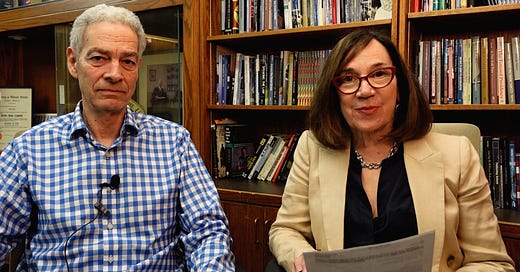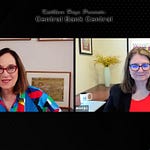Mickey Levy and his colleagues at the Hoover Institution are gearing up for a very special week of monetary policy debate, and analysis. No, I am not referring to the Federal Reserve’s policy meeting, where Mickey like many others see no change in policy as Trump’s tariffs create so many uncertainties over consumer spending, business investment, hiring and more.
The excitement at Hoover, and among economistis and policy makers arriving here at Stanford University, is over not one event but what this year are two very special ones. Not only is it holding its annual monetary policy conference, this year entitled, “Finishing the Job, New Challenges.” Ahead of this it’s also holding a day-long event, “A Celebration in Honor of John Taylor,” the author of the Taylor Rule that has been guiding the Fed’s policy decision for decades now.
Mickey joined me here at Stanford to talk Trump tariffs, and to paint different scenarios of just how severe their impacts will be when all is said and done. And why there it’s not only tariff uncertainty but a resilient U.S. economy that is keeping the Fed from making rate changes now.
So dive in and here what he has to say. His analysis puts important perspective on what lies ahead.
Mickey is a Visiting Scholar at the Hoover Institution, a longtime member of the Shadow Open Market Committe, and a former Wall Street economist now with his own economic consulting firm who has been an economic advisor to the Federal Reserve Bank of New York among many other roles. He will be moderating a panel, “Finshing the Job, Risks Ahead.”
Hoover Honoring John Taylor, His Rule as Standard bearer for Monetary Policy
The first day of the back to back conference is a celebration of John Taylor's work and all of his contributions to theoretical advances in economics and of course, monetary policy and his Taylor Rule have become the standard bearer for the conduct of monetary policy and a benchmark. And it's just his career has just been extraordinary. And then on Friday, the annual Hoover Monetary Policy Conference will have a number of very influential economists and policymakers debating the current global events. And it's quite an erratic, difficult period now. So I hope to learn a lot. Okay. And of course, it is going to be streaming live.
Hoover Conference occurs as tariffs put Fed’s dual Mandate on Collision course 00:02:58:14
The imposition of the tariffs, is on a collision course with the Fed's dual mandate of low inflation and maximum employment. And so the Fed's on pins and needles. And, you know, I don't expect to learn much out of this Fed meeting or Fed Chair Powell's press conference. He will you know, the Fed will announce that they're not changing policy and they will express all of the uncertainties out there. And then we'll then we'll move on to the conference the end of the week. And that might actually more of a news creator in a way. I mean, maybe not more, but still, there's so many current Fed bank, presidents and others, a Fed governor. There are former Fed people. There's people well known for their work, translating a lot of this kind of macroeconomic research to the markets.
The risks ahead from tariffs 00:05:24:08
As you just pointed out, consumer confidence has fallen, But has it fallen just because the public has been inundated with bad news about what the tariffs are going to do? So but presumably when it has this impact, it's going to it's going to slow employment, which is one of the Fed's mandates. And then secondly, you know, to what extent will the higher tariffs which impose a cost on businesses, to what extent will they try to pass on that cost higher to consumers and businesses in the form of higher prices? That should have a onetime impact, but there are just wide uncertainties about the magnitude of the impacts, and these uncertainties are being reflected in the stock market and in various reports. And the Fed has to deal with all of these and so, so do markets, you know, up, down, up, down, you know, stocks, bonds. Everyday you read a different take on, oh, well, now the bond yields steadying…
Expect Changes 00:06:59:15
I do expect several things to unfold in recent weeks, we've learned that President Trump has pain thresholds and has responded to them by backing off on some of his tariffs and tariff threats. I expect more of those, more backing off, more backing on. In addition, we know Trump loves negotiations, and some negotiations are unfolding with specific countries that will lead to negotiated reductions in tariffs. And then we also know that Trump loves it when people kiss his ring and you're going to… he doesn't believe in free enterprise, but he believes in cronyism. And you're going to see over-time here, as the negative impact of the tariffs become exhibited, you're going to see a reduction in the magnitude of tariffs from their current level, and that will be a positive.
Tariffs to hit real economy harder than inflation 00:08:10:05
…the largest impact will be on the real economy and it will not have that big of an impact on inflation. And I believe market based measures of inflationary expectations will remain constrained. Okay. Well, that's and so I think, you know, look, it's a it's an unnecessary environment we're in now because this is what Trump believes in. that could very well cause a mild recession. But it's not going to, you know, completely unravel.
The Fed still thinks it can cut rates 00:13:04:11
…consider the current federal funds rate target is four and a quarter to four and a half. So, the effective funds rate is 4.3%, which is, you know, two percentage points above the current year-over-year rate of PCE inflation. So with that, they perceive that they have room to lower rates. Now when they do so is is open to question that the Fed funds futures market is looking for the Fed to lower rates and I expect they will.
On the current state of the economy 00:15:04:11
But I don't think they're (businesses) going to do a lot of firing because once they fire people' it’s very costly to rehire them. So but I do expect employment to slow. I think the bigger negative impact will be business investment. Right. Okay. But, you know, don't be surprised if the economy remains pretty resilient. Business inventories are under control. You don't have a lot of excess labor. So going into this, you know, the economy's in pretty good shape.
Taylor rule says relax just do it-follow the rule 00:15:55:09
It is our slowing down and the worried about recession. They cut them. Now, that seems like a huge oversimplification of the Taylor will you tell what's the what's the most important contribution or what's the thing when you think of Taylor rule why it's so important? What comes to mind? What do you want to tell people? Well, the Taylor rule is a rule where, as the Federal Reserve conducts monetary policy using discretion and its discretion, has led it over the years to make some bad judgments like it did in 2021, nine years since the GFC. So what the Taylor Rule is all about is here's a very simple, systematic rule that allows the Fed to adjust interest rates to achieve an inflation low inflation objective while still allowing it to respond to counter six counter cyclical to downturn. So it's a rule and what's so beautiful about it is it's not only simple to interpret for policymakers, but it allows them to assess where they are and adjust policy. In the last generation and a half, the Taylor Rule has probably spawned generated more serious research in the economics profession than anything else I can think of. And it's just a real tribute to John.
Dr. Mickey D. Levy
Mickey Levy is a macroeconomist who uniquely analyzes economic and financial market performance and how they are affected by monetary and fiscal policies. Dr. Levy started his career conducting research at the Congressional Budget Office and American Enterprise Institute, and for many years was Chief Economist at Bank of America, followed by Berenberg Capital Markets. He is a long-standing member of the Shadow Open Market Committee and is also a Visiting Scholar at the Hoover Institution at Stanford University.
Dr. Levy is a leading expert on the Federal Reserve’s monetary policy, with a deep understanding of fiscal policy and how they interact. He has researched and spoken extensively on financial market behavior, and has a strong track record in forecasting. Dr. Levy’s early research was on the Fed’s debt monetization and different aspects of the government’s public finances. He has written hundreds of articles and papers for leading economic journals on U.S. and global economic conditions, and has been an active voice on how financial markets are influenced by monetary policy. He has testified frequently before the U.S. Congress on monetary and fiscal policies, banking and credit conditions, regulations, and global trade, and is a frequent contributor to the Wall Street Journal, Bloomberg, and other media.
He is a member of the Council on Foreign Relations and the Economic Club of New York, and has previously served on the Panel of Economic Advisors to the Federal Reserve of New York, as well as the Advisory Panel of the Office of Financial Research.
Dr. Levy holds a Ph.D. in Economics from University of Maryland, a Master’s in Public Policy from U.C. Berkeley, and a B.A. in Economics from U.C. Santa Barbara.













Share this post